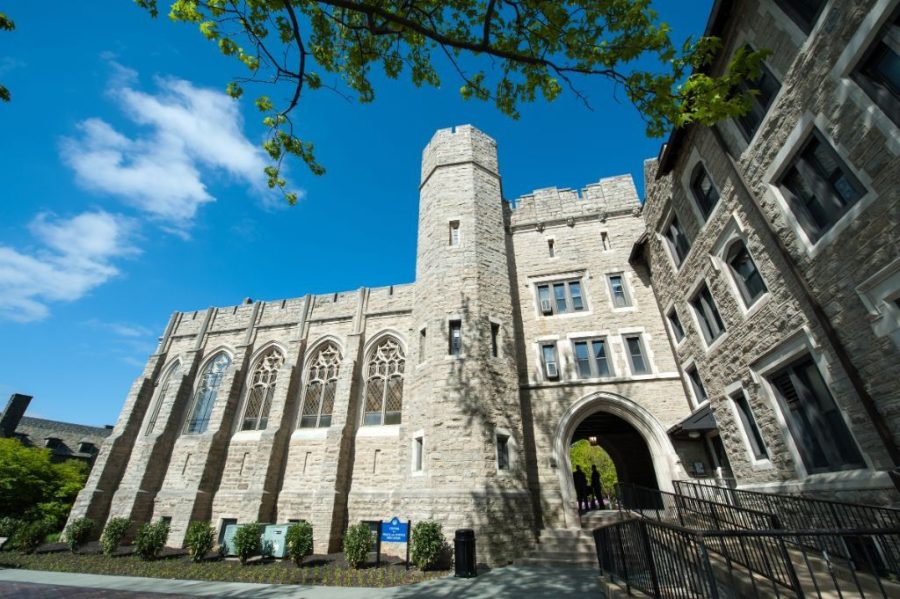Letter to the Press: Student Journalists on Coverage of the Black Lives Matter Protests
Courtesy of Villanova University
Corr Hall, home of The Villanovan
July 10, 2020
This past month has been a moment of reckoning, one that has demanded every industry and institution reflect on the role it plays in the systemic oppression of Black individuals. This includes the press.
As leaders of college newspapers across the country, we bear responsibility for how our own newspapers fail to adequately support Black voices in our communities, contributing to the lack of diversity in the journalism industry overall. The measures necessary to change our newsrooms will differ according to the history of each of our organizations. But we share a responsibility to work to incorporate and amplify Black voices, making our reporting more representative and, consequently, better.
We are committed to working to increase representation and diversity within our own newsrooms, particularly when it comes to magnifying Black student perspectives on staff. We are looking to our own histories and scrutinizing our own reporting to consider where we have erred in the past and how we can do better. By no means can we implement an overnight transformation; we realize that lasting change must be a constant and long-term priority. Right now, we owe it to our communities to interrogate our methods of reporting, consider how we can make these processes more transparent and reduce possible financial barriers to students contributing to our newspapers.
As college journalists, we look to the local and national press to set the tenor of reporting in America. Like most journalists, we believe that fact-driven reporting is vital to a functioning democracy. Over the past several weeks, however, we have watched journalists and media institutions we admire fail to meet the demands of the moment.
Since the start of the protests, we have read headlines and stories that emphasize property damage over police violence. We have noted articles that downplay the prevalence of largely peaceful protests, instead highlighting sporadic acts of violence. We have seen reports that quoted more white than Black protesters.
Instead of working to understand and convey the driving forces behind the protests, journalists too often have reflected the systemic biases of broader society: amplifying voices already powerful, ignoring perspectives already disenfranchised. These failures reflect a long-standing bias in journalism toward white viewpoints.
This bias partially results from adherence to traditional journalistic objectivity, which often centers the perspectives of white experts, leaders and editors. Rather than accepting values sanctioned by a white and Western elite, journalists should actively peel back layers of racist politicization — layers which make supporting Black lives seem like a political stance rather than an irrefutable necessity.
As reporters and editors ourselves, some of whom aspire to careers in journalism, we want to be able to take pride in the role the press plays in promoting democracy and justice. That is why we are joining together to ask journalists and newspapers everywhere: Reflect on these errors and work to improve, while we work to do the same.
We encourage newsrooms across the country to listen to and stand by their Black journalists. It is important not only that we focus on fact-driven and honest reporting, but also that we look to our own colleagues to make sure we are telling these stories correctly. Newsrooms should hold themselves accountable for a lack of cultural understanding and awareness while working toward changing that. Black lives must matter in the newsroom as well.
—–
Charlie Curnin, Editor-in-Chief of The Stanford Daily
Jackie O’Neil, Executive Editor of The Stanford Daily
Claire Dinshaw, Chair of the Stanford Daily Editorial Board
Ryan Nguyen, Editor-in-Chief of the Daily Emerald at the University of Oregon
C. Francis O’Leary, Managing Editor of the Daily Emerald
Emily Cox, Co-Editor-in-Chief of The Villanovan
Tyler Kemp, Co-Editor-in-Chief of The Villanovan
Rishab Ramapriyan, Co-Editor-in-Chief of the Rice Thresher
Ivanka Perez, Co-Editor-in-Chief of the Rice Thresher
Ariyon Dailey, Editor-in-Chief of The Famuan at Florida A&M University
Julia Frankel, Managing Editor of The Student Life
The Daily of the University of Washington
Harrison Freuck, Editor-in-Chief of The Badger Herald
Madison Bober, Editor-in-Chief of The Emory Wheel
Ayushi Agarwal, Managing Editor of The Emory Wheel










